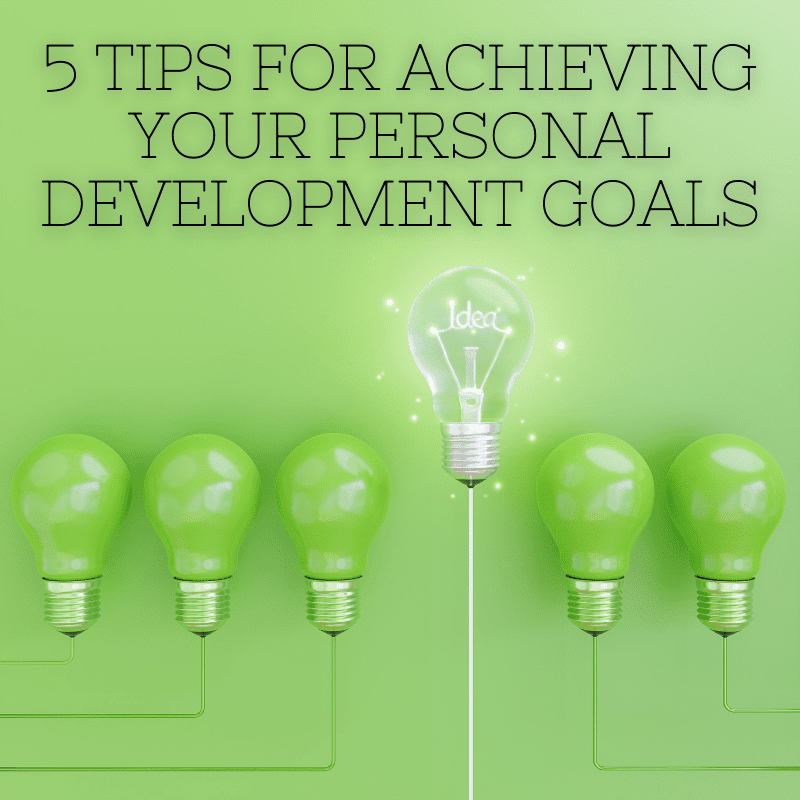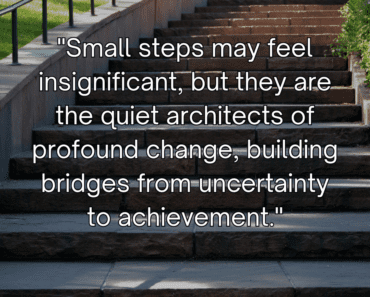Last Updated on February 14, 2023 by Subject Of Life
When it comes to personal development, there is no one-size-fits-all. We are all different, and we all have different personal development goals in life. However, there are some tips that can help anyone achieve their personal development goals, regardless of what those goals may be.

1. Get Clear On What You Want To Achieve
The first step to achieving any goal is to get clear on what you want to achieve.
What do you want to accomplish?
What is your objective?
Once you have a clear understanding of your goals, you can start taking steps to achieve them.
Not Sure What Your Personal Development Goals Are?
It’s important to be crystal clear about your personal development goals. If you’re not, you can’t get clear on what to do to go after them.
First, think about what areas of your life you’d like to improve. For example, do you want to be more successful at work or have better relationships? Or do you want to be more spiritual and have more confidence?
Once you’ve identified the areas you want to focus on, start brainstorming specific outcomes you would like to achieve.
What would it look like to achieve success in each area?
As you’re brainstorming, it can also be helpful to consider what roadblocks might stand in your way, as well as what you need to stop doing now in order to achieve your personal development goals going forward.
2. Set Achievable Goals
When it comes to setting goals, it’s important to be realistic. After all, there’s no point in setting a goal that you know you’ll never be able to achieve. That being said, here are a few steps that you can take to set achievable goals.
First, think about what you want to accomplish. What is it that you want to achieve? Once you have a good idea of what it is that you want, you can start to break it down into smaller goals. Breaking your goal down into smaller pieces will make it seem less daunting and more achievable.
Next, create a timeline for your goal. When do you want to achieve it by? Having a timeline will help you to stay on track and ensure that you’re making progress. Make sure that your timeline is realistic, though. Remember, you don’t want to set yourself up for failure by creating an unrealistic timeline. If necessary, speak with someone who is knowledgeable about the subject to get an idea of how long it will realistically take to achieve your goal.
3. Create A Plan Of Action To Achieve Your Personal Development Goals
Once you’ve set your goals, it’s time to create a plan of action. This is where you’ll detail the steps you need to take to achieve your goals.
Your plan of action should be specific, measurable, achievable, relevant, and time-bound (SMART). A SMART goal is a specific, measurable, attainable, relevant, and time-based goal.
When setting SMART goals for personal development, it’s important to remember that the ‘A’ can stand for either ‘achievable’ or ‘attainable.’
For example, a SMART goal for personal development might be to attend a yoga class once a week for six months. This goal is specific (attending a yoga class), measurable (once a week), attainable/achievable (it’s only six months), relevant (yoga is a form of exercise that can improve flexibility and strength), and time-based (six months).
SMART goals are an effective way to set and track progress for any goal, including personal development goals.
4. Take Action And Stay Accountable
The only way to achieve your goals is to take action. No matter how well you plan or how motivated you are, if you don’t take action, you won’t get anywhere.
It’s also important to stay accountable to yourself. This means holding yourself accountable for taking the actions you said you would.
There are a few different ways you can do this.
You could keep a journal and track your progress.
You could set up reminders or alerts on your phone.
Or you could find an accountability partner who will help keep you on track. This one will work the best because it’s easy to skip out on yourself, but there’s nothing harder than failing in front of an accountability partner.
5. Be Persistent And NEVER Give Up
The final tip for achieving your personal development goals is to be persistent and never give up. There will be setbacks and roadblocks along the way. But as long as you don’t give up, you will eventually reach your goal.
Find a support group. Whether it’s an online community or a group of friends who are working towards similar goals, having people to talk to and share your journey with can be a big help. Knowing that others are going through the same thing can give you the motivation you need to keep going.
Make a plan. Having a specific plan for how you’re going to achieve your goal will make it feel more real and within reach. Write down what you need to do each day, week, or month to move closer to your goal, and then follow through with your plan.
Keep a positive attitude. It’s inevitable that there will be setbacks along the way, but it’s important to stay positive. Believe in yourself and your ability to achieve your goals, and don’t let anything stand in your way.
Creating and achieving personal development goals is not always easy. But if you follow these tips, you’ll be well on your way to success.
25 Ideas To Help You Come Up With Some Personal Development Goals
Not sure exactly what goals you want to set around personal development? Here are some ideas to springboard from.
- Become more organized – Being more organized will help you in every area of life. You’ll be able to get more done, both at work and at home. You’ll feel less stressed, and you’ll have more time for the things you enjoy.
- Set boundaries – Setting boundaries is important for maintaining your sanity and taking care of yourself. It’s also important for relationships. If you don’t set boundaries, people will take advantage of you.
- Get rid of negative thoughts – Negative thoughts can hold you back in life and prevent you from achieving your goals. If you want to be successful and happy, you need to learn how to move past them as quickly as possible.
- Be more patient – Patience is a virtue, and it’s one that will help you in many areas of life. If you can learn to be more patient, you’ll be more successful in your career, your relationships, and in other areas of life.
- Learn to say “no” – Learning to say “no” is one of the most important things you can do for yourself. If you don’t learn to say “no,” you’ll end up taking on too much and spreading yourself too thin.
- Take care of your health – Your health is one of the most important things in your life. If you don’t take care of it, you won’t be able to enjoy your life or achieve your goals.
- Get rid of clutter – Clutter can be a major distraction, and it can also hold you back emotionally and mentally. If you want to be successful, you need to get rid of it.
- Simplify your life – A simpler life is a happier life. If you can simplify your life, you’ll be able to focus on the things that are truly important to you.
- Spend time with positive people – Surrounding yourself with positive people will help you stay positive and motivated. If you’re around negative people, it’s easy to become negative yourself.
- Don’t compare yourself to others – Comparing yourself to others is a sure-fire way to feel inferior and unaccomplished. It’s also a great way to set yourself up for disappointment. Instead of comparing yourself to others, focus on your own goals and accomplishments.
- Set realistic goals – Setting unrealistic goals is a recipe for disappointment. If you set goals that are too high, you’ll never be able to reach them and you’ll end up feeling frustrated. Set realistic goals that you can actually achieve, and you’ll be much more successful.
- Don’t procrastinate – Procrastination is the enemy of personal development. If you want to grow and achieve your goals, you need to take action and not put things off.
- Be persistent – Persistence is one of the most important qualities for personal development. If you give up too easily, you’ll never achieve your goals. But if you’re persistent, you’ll eventually reach your destination.
- Be flexible – Flexibility is an important quality for personal development. If you’re too rigid, you’ll miss out on opportunities. But if you’re too flexible, you’ll never get anything done. Find a balance between the two, and you’ll be much more successful.
- Be resilient – Resilience is the ability to bounce back from setbacks. If you want to be successful, you need to be able to handle disappointment and failure.
- Learn from your mistakes – Everyone makes mistakes, but not everyone learns from them. If you want to engage in personal development, you need to learn from your mistakes and use them as an opportunity to grow and improve.
- Have a positive attitude – A positive attitude is one of the most important things for personal development. If you have a positive attitude, you’ll be more likely to achieve your goals.
- Be grateful – Gratitude is one of the most powerful emotions. It’s been shown to increase happiness and well-being. If you want to experience more personal development, start practicing gratitude on a daily basis.
- Meditate more – Meditation has many benefits, including reducing stress, improving focus, and increasing self-awareness.
- Get enough sleep – Sleep is essential for good health and well-being.
- Take more breaks – Taking breaks is important for both your physical and mental health. If you’re always working, you’ll eventually burn out. Make sure to take breaks throughout the day, and you’ll be much more productive overall.
- Simplify your to-do list – A long to-do list can be overwhelming and stressful. If you want to do things that result in personal development, make sure your to-do list is realistic and manageable.
- Delegate – Delegating tasks can be difficult, but it’s necessary if you want to engage in personal development. If you try to do everything yourself, you’ll quickly become overwhelmed and stressed out, and you will retreat back into your shell where you don’t want to do anything. Learn to delegate tasks to others, and you’ll be able to focus on the things that are truly important to you.
- Set boundaries – Setting boundaries is essential for both your personal and professional life. If you don’t set boundaries, you’ll quickly become overwhelmed and overworked. But if you set healthy boundaries, you’ll be able to focus on the things that are truly important to you.
- Take care of yourself – Taking care of yourself is one of the most important things you can do for your personal development. Make sure to prioritize your own health and well-being.





